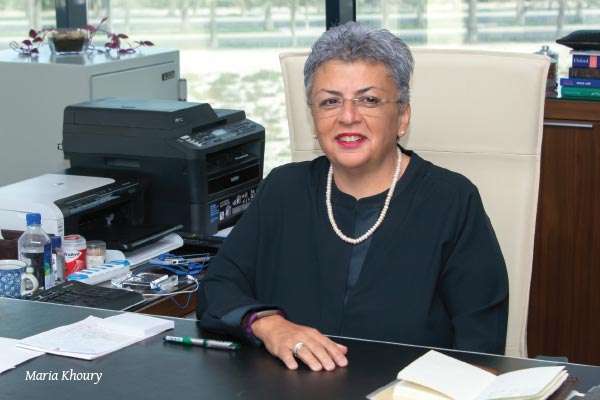The island’s first female head of the National Institution for Human Rights (NIHR) tells Liz O’Reilly of her passion for the job and plans for the future.
Maria Khoury was unanimously elected chairwoman of the NIHR in November, becoming the first woman to serve in the role. While delighted, she also points out that this is not so unusual for Bahrain, saying: “I can’t deny that it’s special to be elected and have my colleagues’ trust and I shall strive to be the right person for the job. Whether it’s a man or a woman, the challenges are the same – the person will be assessed on their achievements. Bahrain society is open and transparent and I don’t believe there’s a gender bias.”
Maria was appointed to the NIHR as a commissioner by His Majesty King Hamad bin Isa Al Khalifa in 2013. She is a member of Bahrain’s Christian minority and her family has been in the Kingdom more than 100 years. Prior to joining the institution, she was in media for many years but says, with this appointment she “found her passion, I love this job”.
The NIHR is independent of government and anyone resident in Bahrain can make a complaint if they feel their human rights have been violated. Its role is to investigate such allegations and help to resolve them, whether by referring them to a legal body or offering legal assistance, working with the complainant and offering advice on how to take matters forward should the issue fall outside the NIHR’s remit.
Two fairly recent initiatives are the opening of a centre to work against human trafficking, positioned close to the labour authority in Sehla – which frequently deals with issues raised by domestic workers – and the establishment of a 24-hour hotline number on which people can call to register a complaint.
On the difference between the NIHR and other international organisations, Maria explains: “We differ from other human rights bodies because we are a national institution established within the law of Bahrain and we have a mandate. We are the voice of Bahrain and we have the power to work with bodies locally, which gives us credibility. We are also a member of GANHRI, the global alliance of human rights organisations, which all international institutions either belong to or strive towards.”
Another big part of the organisation’s work is in human rights training, for both its own staff and for public sector and NGO workers, to ensure they are aware of the issues in their everyday practice. NGOs can include anything from disabled organisations to charity groups, dealing with various areas.
And the NIHR also has the right to perform unannounced visits to places of detention – from prisons to psychiatric hospitals and juvenile holding facilities. Maria, herself, was trained by the UK’s HM Inspectorate of Prisons, and says: “You learn to use your eyes, but you also have to be involved – for example if someone says the food is bad, you have to taste it – and you have to be able to work to set benchmarks of what is acceptable and what is not.”
She adds that things have changed in recent years,explaining: “The landscape on human rights has broadened and we have taken huge positive steps. We can say that the police have been trained and retrained to have a human rights-based approach, as has the judiciary, and we have good relations with the police and also with the law faculty at the University of Bahrain, which sends students to us for training.”
For the future Maria’s aim is to build teamwork within the organisation between the commissioners and the committees and also to expand the relationship with the island’s NGOs.
She concludes: “We do have challenges that we face with a strong stride. We are committed to our work and we work with passion and hope that we will make a difference, but we need to work together, that’s the most important thing – one hand alone doesn’t clap – and we must work together not just as an internal team but also with society.”


































